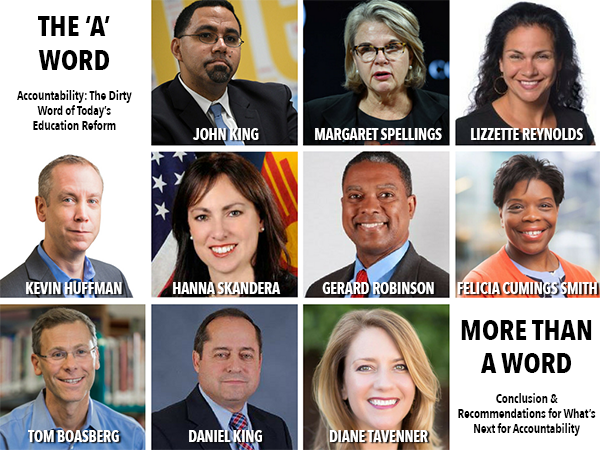The ‘A’ Word: Wicks & McKenzie — The 4 Things That Accountability Should Do Well

This piece is part of The ‘A’ Word series, produced in partnership with the Bush Institute to examine how “accountability” became a “dirty word,” and what can and should be done going forward to ensure accountability withstands the test of a bad reputation. Click through the grid below to read other ‘A’ Word conversations.
Our experts agree: Accountability allows us to organize and operate schools in ways that put kids first, and the stakes could not be higher for us to get this right. Either we master the duet of accountability and support or we risk what makes our country distinct and what has accelerated its prosperity — educated citizens who are able to provide for themselves and their families, who create new ideas and opportunities, who engage in their communities, and who value democracy and the right to vote. A society that declines to meaningfully invest in all of its youth will steadily weaken over time, both morally and structurally.
At the outset of The ‘A’ Word series, we acknowledged that the work of educating children well is incredibly complex, especially for our most vulnerable young people. We also asserted that complexity does not justify a retreat from working to get this right. To paraphrase President George W. Bush, we cannot solve the problem if we cannot diagnose it correctly and comparably. Connecting effective supports — people, interventions, funding — to the right schools and students happens only if we effectively measure student progress.
But as our experts detailed, there is a range of plausible indicators for an accountability system. Making sense of that can be overwhelming, but two simple questions can help sort the significant from the noise. First, do parents and educators understand what was measured and why it matters? Second, are the data actionable for parents and teachers — do they know what supports their student needs? These questions may seem obvious, but they are too often obscured in practice.
(Click through the grid below to read other ‘A’ Word conversations)

Much of today’s accountability policy discussions and debates center on the Every Student Succeeds Act, which presents both an opportunity and a risk by asking states to lead instead of to follow federal mandates. We know that some states will take advantage of this moment to bring their best to bear, and their kids will benefit. Some states will not, and their kids will be left behind. The plans submitted to date reflect this variance.
As Margaret Spellings so clearly stated in her interview, “There is this crazy quilt of accountability systems across the country, with lots of local latitude to maneuver the fine print. This is harsh language, but there is no central authority to monitor any of that and keep them honest. Left to their own devices, they’re going to go easy on themselves. That’s human nature.”
Given that, it is up to all of us to pay attention to implementation and results, to keep talking about both, and to keep peering behind the scenes to understand the adult forces at play throughout. The work of the Collaborative for Student Success and Bellwether Partners is a good place to start for information and insight. We recommend a focus on the following as well.
More is not more. State accountability indexes require a level of complexity to ensure validity, but that complexity should never supersede clarity. Some proposed state plans include accountability indexes that are nearly impossible to follow — or that measure so many things that they are meaningless for educators and parents.
California’s dashboard of many colors, as eye-catching as Joseph’s coat but with significantly less meaning, is a perfect example of the latter. The dashboard is muddled and messy. Parents and educators are left stranded without accessible and actionable information. To make matters worse, recent revisions by the state agency moved some schools out of the bottom categories because too many schools were measuring as failing. Adult optics beat student needs once again.
Anyone who creates or signs off on a state accountability index should be able to explain it, clearly, to educators, parents, and community stakeholders. What are the indicators measuring, and why is that important to know? How are these being weighted to determine overall performance of a district or school? Are all students included?
Diane Tavenner said it best. As a parent, she wants to know the answers to three yes-or-no questions about her own son: “Is he on track to be successful in his next phase of education or life? Has he been able to discover his interests? And does he have a goal for where he wants to go in the future, and is he on track for that?”
These questions are not unreasonable; in fact, we should expect every parent, guardian, and educator to ask and know this information about their students. Far too many educators are unaware of or ignore state accountability plans because they seem overly complex and disconnected from daily classroom practice. We should not require that parents, teachers, and principals make meaning of too-often opaque policy on their own. It is our job to make it explicit, over and over and over.
Yin and yang are paired for a reason. Our experts agree: Accountability without support and support without accountability are equally ineffective at improving student outcomes. Tom Boasberg described this well: “For me, accountability is having clear goals, being transparent about the degree to which you’re meeting them, and possessing the willingness to make changes and improvements. Critically, that includes supports when we’re not meeting our performance goal.”
Well-designed accountability policy, on its own, does four things well:
1. It requires participants to believe that all students can learn and succeed.
2. It measures the academic progress of all students over time.
3. It highlights gaps between different groups of students (be they grouped by racial, geographic, socioeconomic, special education and gifted students, or English language proficiency categories).
4. It assigns consequences for not meeting goals around student progress.
Accountability policy points to the need for support in targeted or comprehensive ways, but it does not deliver those supports specifically. Those supports and interventions need to be readily available, high-quality and research-based, and delivered meaningfully to schools and districts. In other words, a day of lukewarm professional development doesn’t cut it, even if everyone attending gets matching T-shirts to celebrate the initiative du jour.
It is an open secret that there are not enough high-quality and research-based interventions available to educators. Education is a sophisticated profession, not a craft, and it deserves proper research-based supports for its practitioners at the instructional level, at the systems level, and points in between. Supporting applied research in education is critical; federal funding is important, as are incentives for higher education and others to focus research on issues of practical, K-12 student success.
Several state plans describe a planned shift in the state education agency from a compliance mindset to a support mindset. While this is entirely correct, it is also an enormous lift to execute this type of culture change and to staff it for long-term success. This is a place for all of us to pay attention. Our lowest-performing schools, largely serving our most vulnerable kids, will struggle to improve without sophisticated support from experienced professionals. All educators and schools deserve this, but most state systems are in the early stages of doing this better. Louisiana is a state to watch and learn from in this area.
Implementation of “the what” is equally important as “the what” itself. Education is littered with well-meaning interventions that looked great on paper and sounded better in the sales pitch. The implementation, however, left most of the impact on the table. It is not difficult to tally up millions of dollars spent in and for schools that have left minimally discernible impact in their wake.
Schools and districts are complex human environments. Change is difficult, but not impossible, and we can all learn from the schools and districts that have very intentionally changed practice to better serve students, as well as fields beyond education that think deliberately about implementation. Medicine is a good place to start (hospitals and clinics are also complex human environments), as its rigorous focus on science, measurement, and protocol is worth better understanding and adapting.
At the Bush Institute, we are deeply concerned and curious about how to better support and promote effective implementation. In fact, our soon-to-be-launched district cohort focused on our Principal Talent Management Framework will have a two-pronged curriculum. The first is centered on the technical specifics of the Framework, and the second is focused on tools and support needed for effective implementation. We are relying on experts both inside education and beyond its borders to create an implementation framework that goes further than planning timelines to incorporate tools for problem-solving and understanding political capital. We know we have much more to learn here, so we will be sharing as much as we can over the next three years of the project with others also grappling with these questions.
Education accountability matters so intensely because young people deserve agency in their futures. We want the children we love personally to have that agency, which means we need it for all children. It is up to us to ensure that every child, regardless of personal circumstance, has options and choices for their own lives. Without real accountability, we are simply unable to deliver on this promise. This work is difficult. It is messy. It requires challenging long-held assumptions and structures, as well as some leaders.
To invoke the lessons of Greek philosophy, we can now choose to lead as Sisyphus or Odysseus as we look forward. If we choose the former, we resign ourselves to being the kind of leaders who push that boulder up and up for all eternity, never creating meaningful progress as we repeat the same actions. If we choose the latter, we elect to be the kind of leaders who understand that this journey is long but worthwhile, and that success requires bravery, strength, persistence, and smarts.
Nothing more than our future is at stake to get this right.
Anne Wicks is director of education reform at the George W. Bush Institute. William McKenzie is editorial director at the George W. Bush Institute.
Get stories like these delivered straight to your inbox. Sign up for The 74 Newsletter

;)